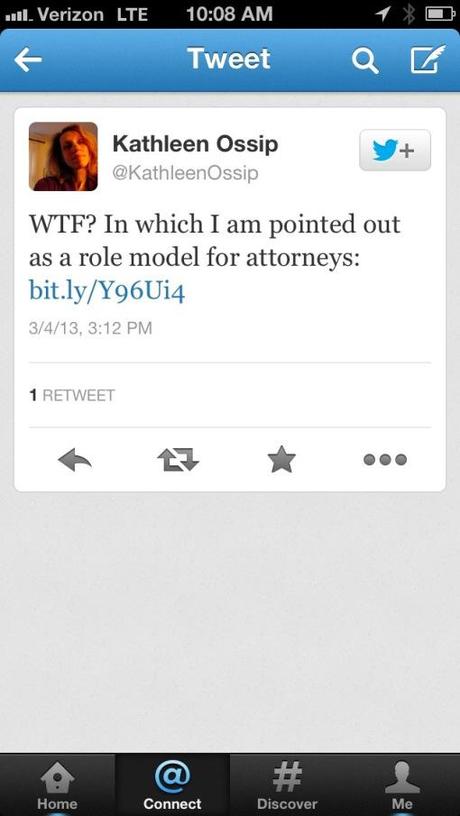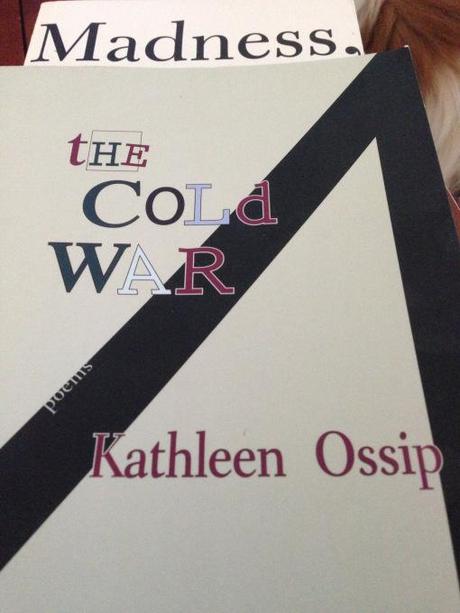Earlier this week in my Research: Deep and Wide post, I wrote about the importance of reading for breadth as well as depth. I referenced quotes from two poets, Susan Howe and Kathleen Ossip, as examples of both kinds of research. It turns out (small world!) that someone forwarded my post to Ms. Ossip, and then this happened:

Of course I immediately whipped up a scathing but hilarious response that alluded to Bukowski’s “poetry readings” and taunted academics about needing to get out a little more. Then I put it aside for a bit while I cooled off; that’s the advice I give my clients when they’re busting down barn doors and I try to abide by it myself.
I’m glad I did, because I’ve revised my response some and this is it.
First, permit me to point out, Ms. Ossip, that I never held you up as a role model for lawyers. For one thing, lawyers work really hard, even during the summer. (So this is still a bit snarky, but much, much less than it was originally.) I used your quote to suggest that good ideas often originate from disparate information absorbed over time. I drew it from a longer quote in which you were discussing how you researched your collection, “The Cold War,” a copy of which I actually have on a shelf in my living room. I liked it, which is part of the reason I was so pleased to see you quoted in Jeff Skinner’s book. Here’s proof:

I included Mary Ruefle’s “Madness, Rack and Honey” in the photo so that a) it would be clear that I wasn’t using a stock photo and b) it would be clear that I am an actual, honest to God consumer of poetry. I go to work, earn money, pay my mortgage and use what’s left over to buy books of poetry and the Kenyon Review. And stuff.
If you read any of the other posts on my blog, you saw that I use literature and poetry pretty frequently. I’ve managed to cobble together a little knowledge of poetry despite not having obtained an M.F.A., I enjoy it, and I like to share it. I believe there is a place for poetry outside of academia, or at least I hope there is. Maybe I should ask you that question. Is it still okay for folks like me to say things about poetry? Or is that a privilege reserved to the faculty room?
Also, maybe you forgot that there are lawyers (and doctors, and clerics, and spinster women in Amherst) who write poetry. Maybe you are even familiar with some of them: Wallace Stevens, Lawrence Joseph, Edgar Lee Masters, Archibald MacLeish. Joseph doesn’t practice, but he’s not an academic either because he only teaches at a law school. And let us not forget Ernest Hemingway, who was not a lawyer or a poet but who did, I understand, chase ambulances at one time. I don’t include myself in that company by any stretch of the imagination. I’m just saying that there is some precedent for lawyers mixing themselves up with poetry. We’re not as boorish as you might think. We don’t even require animal sacrifice at ABA-accredited law schools anymore, although it’s still available as an elective.
My earlier draft came from an insecure, defensive place, because, yep, I do write poetry myself, and it isn’t pleasant when someone you look up to mocks you on Twitter. (Although in fairness and for the record, my post went out to my 2,200+ followers, and yours to your 250. I’m resonating with somebody, apparently.) Then it dawned on me: I’m a rarity in the world of poetry. I have money to buy stuff. And it’s my actual money, not a grant or a fellowship or a gift from Yaddo. I get to write what I want without using up the limited financial resources available to support writers based in academia. The fact that I have built a little audience for my writing means that I get to share poetry – not mine, because I’m not that arrogant, but poems and poets that I really like – with people who don’t subscribe to the Kenyon Review. The last time I checked, that is a good thing, as Martha would say. I’m going to keep doing it. That’s WTF.
